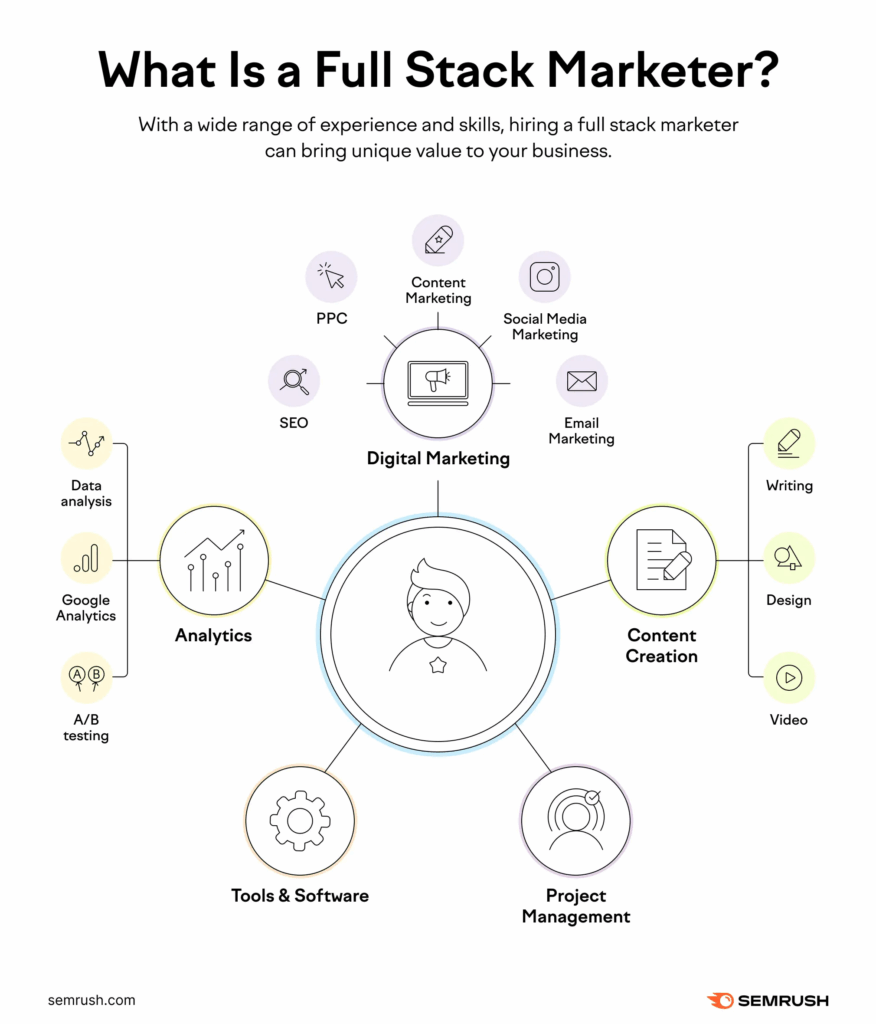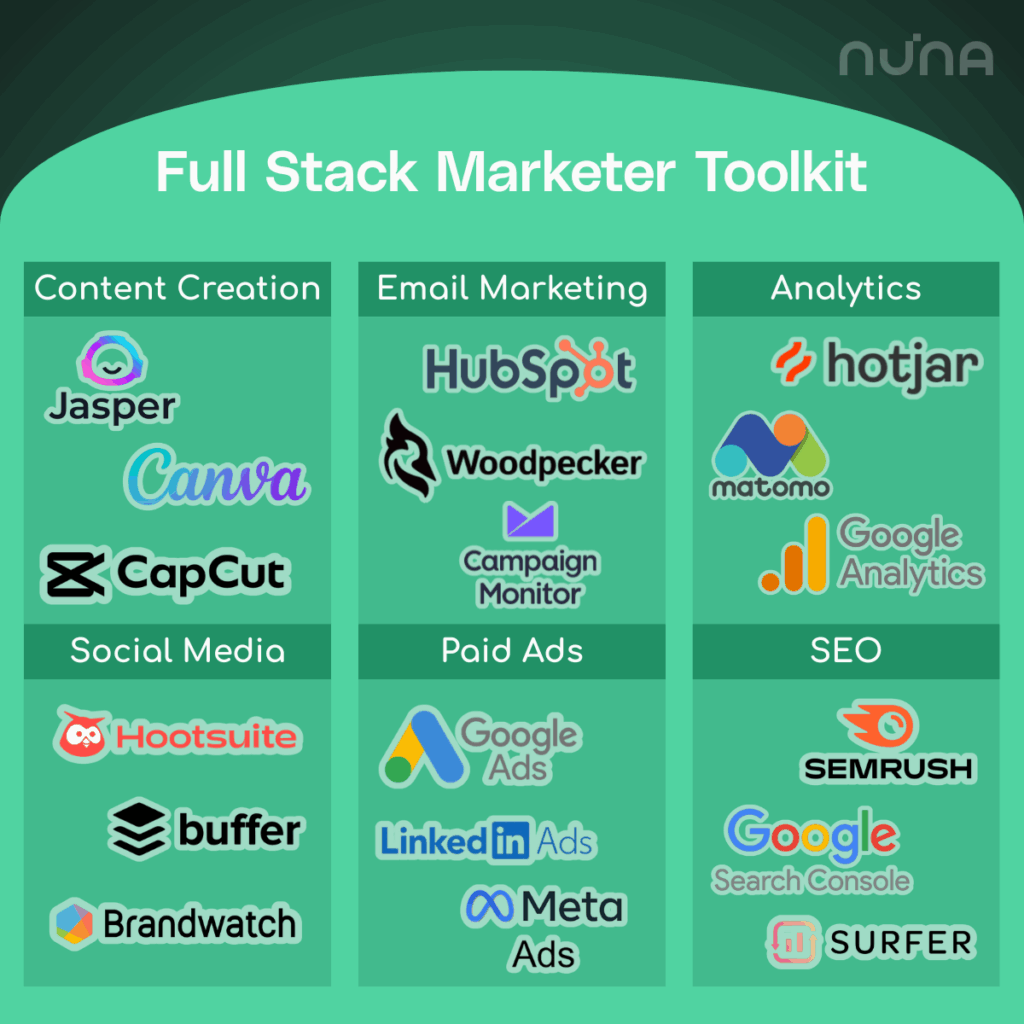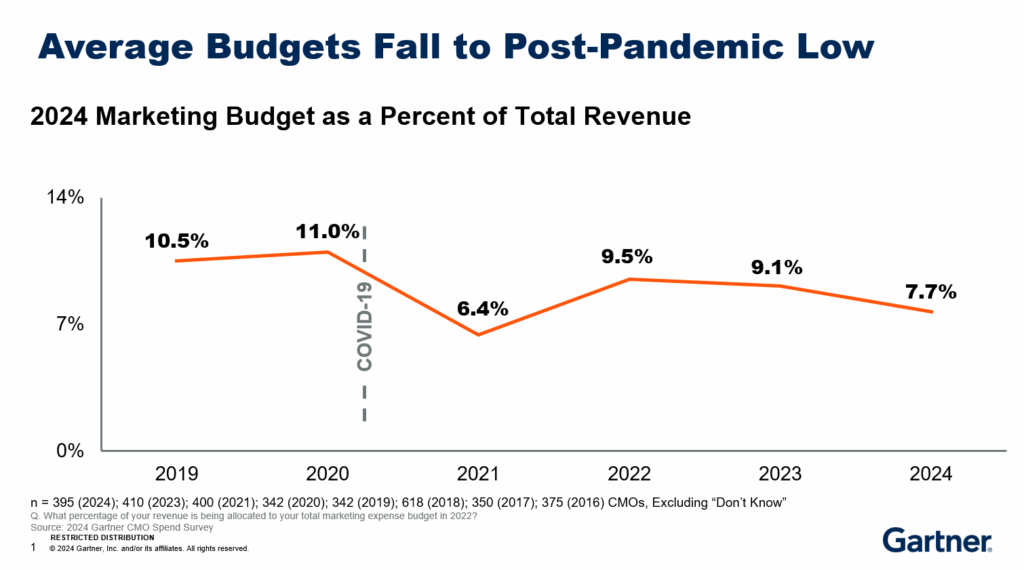Life science startups often face a familiar dilemma: ambitious growth goals paired with limited resources. This is precisely why a single, well-equipped full-stack marketer – often with strategic external support – can make all the difference to your success.
What is a Full-Stack Marketer and Why They Matter
In early-stage life science companies, commercial roles rarely fit neatly into specialized boxes. You typically won’t find a dedicated content team, a performance marketing manager, a brand strategist, or a CRM expert – and there’s definitely no time to wait for one. This is where the full-stack marketer comes in.
Inspired by the concept of a full-stack developer, a full-stack marketer is someone who can navigate the entire marketing spectrum. They move seamlessly from strategy to execution, from data to storytelling, and from brand building to lead generation.
These aren’t just broadly knowledgeable generalists; they’re curiosity-driven, multi-skilled builders. They can launch campaigns, test channels, craft compelling copy (or get it written by someone else), set up basic automations, and engage in high-level business discussions with leadership. They thrive where budgets are tight, speed is critical, and priorities shift rapidly.
If you’re an early-stage venture in life sciences or deep tech, this reality will resonate. Whether you’re a startup seeking product-market fit or a scale-up expanding into new markets, having a marketer who truly understands your business, speaks your industry’s language, and can work across disciplines is a huge strategic advantage. The good news is that advancements in digital tools, AI, and automation have supercharged marketing capabilities, allowing individuals and lean teams to achieve more than ever before.

Image source: SEMRUSH
The Typical Marketing Struggles in Life Science Companies
Life sciences companies are often founded by brilliant minds – scientists, engineers, clinicians – who know their domain inside out. Yet, when it comes to marketing, these same companies often feel lost and overwhelmed. It’s not that they don’t value marketing; it’s that their primary focus is on creating and improving their product. Marketing often falls outside their core expertise, and traditional marketing playbooks frequently don’t apply.
Here’s why:
- Complex Products: We’re not talking about simple apps. We’re discussing biosensors, spectrometry, AI-enabled diagnostics, or RNA-reagents. The value is profound but often hidden in dense science. It takes time, context, and sophisticated storytelling to explain. Few marketers know how to translate this complexity into something a buyer (or an investor) can quickly grasp. The founding team’s input is invaluable here.
- Niche, Skeptical, and Highly Educated Audiences: Your typical buyer is a scientist, a lab director, a medical advisor, or a procurement expert. These professionals are unimpressed by marketing fluff or vague promises. They demand clarity, precision, and verifiable facts. If they feel misled once, you’ve likely lost their trust forever.
- Tight Budgets, Especially in Early Stages: Most life science startups simply can’t afford large in-house marketing teams. Often, there’s just one marketing person expected to “do everything.” This individual must be both strategic and hands-on – a rare gem to find.
- Marketing Often Comes “Too Late”: In many companies, the focus is 100% on product and technology. Marketing becomes an afterthought. It’s only when the product is “ready” or funding dwindles that the sales pipeline gets the attention it deserves from the beginning. By then, it might be too late to build essential awareness, trust, and authority.
- Leadership Doesn’t Always Trust Marketing: In science-driven cultures, marketing is sometimes viewed as secondary to the “real work.” There’s often a disconnect between business goals and how marketing can contribute, especially when facing long sales cycles, regulatory hurdles, or grant-based revenue.
This is precisely why life sciences and deep tech companies need a different kind of marketer: someone who doesn’t just run campaigns but thinks like a founder, understands the market and business models, and can build from scratch, hand-in-hand with the leadership team.
The Founder’s DIY Approach (and Why It’s Not Sustainable)
In many early-stage companies, the founder acts as the de facto marketing department – pitching at conferences, writing LinkedIn posts, taking sales calls, and coordinating website redesigns. And to be fair, this often works for a while. Founders are typically the most credible and passionate voices in the company.
However, as the business scales, this all-in-one role becomes unsustainable. Marketing cannot rely on one person forever, especially someone already building the product, managing the team, and engaging with investors. That’s where a full-stack marketer steps in: not to replace the founder, but to amplify their voice and translate their vision into scalable marketing actions.
Key Skills and Tools of a Full-Stack Marketer
So, what should a strong full-stack marketer bring to your life science startup?
- Strategic Thinking: They’ll deeply understand your market, product, go-to-market strategy, customer segmentation, positioning, pricing, and overall business model. They ask “why” before jumping to “how.”
- Content Creation: From long-form articles to LinkedIn posts, landing pages, newsletters, pitch decks, and case studies – they not only make complex ideas compelling but also understand the vital need to embed themselves within your organization. This allows them to extract the best insights from your founders, R&D, and product teams to share with the world.
- Channel Execution: They know which channels to prioritize at which stage, whether it’s organic reach or paid campaigns, without spreading resources too thin. They can test, optimize, and pivot as needed.
- Basic Tech Skills & Curiosity: They’re comfortable with no-code tools, CMS platforms (like Webflow or WordPress), email automation, analytics, CRM, form builders, and even scraping tools. They readily test what’s available and get things done, whether on their own or with external support.
- Business Fluency: They understand how revenue is generated and think in terms of brand building, demand creation, lead generation, increasing market share, and a robust pipeline. They speak the language of sales numbers and customer value, not just ToFu, MoFu, BoFu, impressions, and clicks.
- Soft Skills & Founder Alignment: They’ll easily get along with your team, gracefully gathering what they need from colleagues and connecting with potential partners. While being collaborative, they should remain autonomous and confidently push back when necessary.
Equipped with these capabilities, a full-stack marketer is like a Swiss Army knife for your life science business – resourceful, fast, and entrepreneurial.

Tool Categories in a Full-Stack Marketer’s Toolkit
The Business Impact: Speed, Agility, Focus
In early-stage or resource-constrained environments, marketing often stalls due to execution bottlenecks, not a lack of ideas. A full-stack marketer works intimately with the business, allowing adjustments to happen in real-time, without layers of coordination. This isn’t about working faster for its own sake; it’s about moving with clarity and precision when timing matters most. Because this person understands both commercial goals and operational constraints, they can prioritize what truly brings value without adding unnecessary complexity.
Real-World Use Case
Have you ever seen how truly small, aligned teams can easily outperform larger ones? For many founders, this is a welcome truth: a well-aligned two-person team can sometimes achieve more than five function-specific experts. Why? Because in teams where everyone only focuses on their own turf, inefficiencies and communication breakdowns inevitably emerge, often entirely avoided by a smaller, integrated team.
Imagine this common scenario: Someone is responsible for drafting a white paper or gathering raw material from a reference client. Another person is supposed to proofread it. A graphic designer needs to export it to a professional-looking PDF, and the website manager needs to upload it, so the social media manager can prepare a LinkedIn post linking back to the website. We might laugh, but this is a reality for some teams. Add an “it’s not my job” mentality, and things can derail very quickly.
With the right system, modern tools, and just a little goodwill, one full-stack marketer can get the raw material, ensure it’s approved by a scientific colleague, make it look professional, and take care of its distribution across all relevant channels.
How to Find or Grow One (and When to Outsource)
We’ve covered the theory. Now for the tough news: finding a full-stack marketer for a life science startup can be incredibly difficult. Securing one with your ideal life science education and professional background often feels like winning the jackpot – possible, but unlikely.
Our general rule of thumb: a full-stack marketer from a different industry can often make it work. With extra effort and strong team collaboration, they can bridge the domain knowledge gap. However, be aware that their ability to fully assess scientific content quality might still be a hurdle in some situations.
Another key insight: a full-stack marketer typically thrives remotely or in a hybrid setup when they are a senior professional. If you’re looking for a more junior person to grow into this role, having them physically present often makes all the difference. We firmly believe this is universal – junior team members develop faster when immersed alongside their more senior colleagues.
When does outsourcing come into play? It’s when the search for that rare full-stack marketer feels endless, especially with the specific life sciences background you need. Or when growing this expertise internally simply isn’t feasible given your setup or lack of in-house guidance.
In these scenarios, bringing in an external partner offers the immediate expertise and flexible support required, allowing you to sidestep recruitment headaches and accelerate your journey to market.
Outsourcing specific marketing functions is also a strategic move, enabling you to establish crucial foundations like your website, tech stack, or analytics before transitioning to building a robust brand and content strategy in-house or in mixed model.
Need Help Building a Lean Yet Powerful Marketing Setup in Your Life Science Company?
The concept of a full-stack marketer isn’t new, but it gained significant traction recently, driven by market trends. With marketing technology evolving rapidly and AI becoming popularized, expectations for productivity are soaring even as marketing budgets face downward pressure. Gartner’s Annual CMO Spend Survey revealed that 2024 average budgets have fallen by 15%, as CMOs pursue growth in the “Era of Less.”

If you’re also facing the challenge of meeting ambitious business goals without a large team of in-house experts and on a lean budget, let’s talk. We can discuss how our domain experience, AI-powered solutions, and transparent approach can help you get there.

